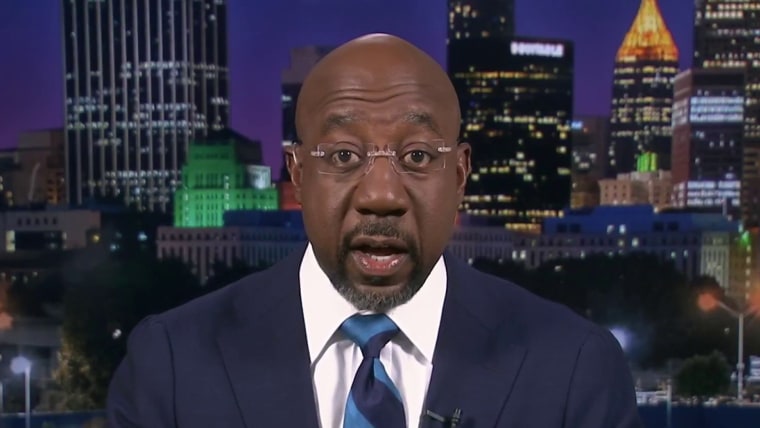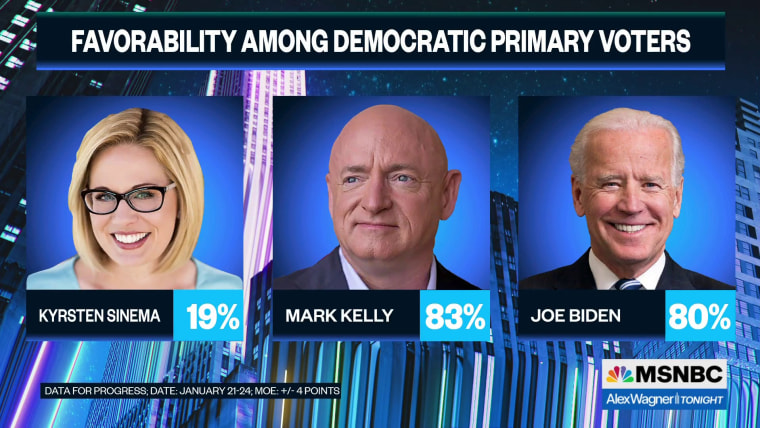Sen. Kyrsten Sinema, I-Ariz., defended the filibuster onstage during a panel in Davos. Speaking to the world’s elites, the newly independent Sinema dismissed concerns that, maybe, restoring and enhancing voting rights was more important than the mistake of history that is the Senate’s de facto 60 vote threshold.
For me, only recently returned from vacation, that dozen or so words — “Sen. Kyrsten Sinema, I-Ariz., defended the filibuster onstage during a panel in Davos” — was enough to pierce through whatever chill I had accumulated during my time off. Because it’s not just that Sinema is wrong about the filibuster, which is a point that I’ve made many times over the last two years. It’s that she is now so smugly wrong, and in a way that glosses over the biggest problems this country is facing.
Let’s leave aside for a moment the high-five she shared with fellow panelist Sen. Joe Manchin, D-W.Va., over their continued rejection of any changes to the filibuster rule. Instead, we’re going to focus on her comments surrounding the voting rights bill that stalled out around this time last year in the face of a GOP filibuster. (For context, she made these remarks in response to the panel’s moderator asking about her decision to leave the Democratic Party last month.)
One good election cycle does not mean that the Democrats were wrong to be worried about the state of voting rights in our country.
Sinema told the World Economic Forum audience that in the two years after the Jan. 6, 2021, attack on the U.S. Capitol, “the Democratic Party shared a narrative that said we would not have any more free and fair elections in this country if the United States Congress didn’t eliminate the filibuster and pass a massive voting rights package.” She noted that even though that bill didn’t pass, “we had a free and fair election all across the country.”
Most election deniers lost, she added, while members of both parties managed to win elections. “So, one could posit that the push by one political party to eliminate an important guardrail and an institution in our country may have been premature or overreaching in order to get the short-term victories they wanted,” she mused.
On the one hand, there’s a nugget of truth in her framing. It was clear that Democrats’ push for voting rights, which had already been underway in the previous Congress, kicked into overdrive in the aftermath of Jan. 6. The drive harnessed the spirit of former Obama White House chief of staff Rahm Emanuel who famously said in 2009: “Rule one: Never allow a crisis to go to waste. They are opportunities to do big things.”
But one good election cycle does not mean that the Democrats were wrong to be worried about the state of voting rights in our country. For starters, it discounts the amount of work done on the ground that went into overcoming the disenfranchisement efforts from the GOP this cycle. It’s not like Georgia Democrats were able to coast after the Republican-led legislature there and in other red states rolled back procedures that made it easier to vote in 2020.
More importantly, the long-term threat remains. The Justice Department is still unable to fully enforce the Voting Rights Act a decade after the Supreme Court gutted it, even as it is being further chipped away at year by year in the courts. The package that would have restored and enhanced the VRA was partisan not because the benefits of making it easier to vote solely favor Democrats but because Congressional Republicans refused to go along with it.

Without Congress setting universal standards for its elections, the states are still left free to tack on as many restrictions at the ballot box as what’s left of the VRA will permit. And despite her claim that “most election deniers lost across the country,” Congress is the glaring exception given how many returned to their comfortably gerrymandered seats — another anti-democratic relic that the voting rights bill would have eliminated.
Also, the bill that Sinema now is second-guessing is one that she said she would vote to pass — you know, if it weren’t for that pesky filibuster getting in the way. No matter how much she defends it, the fact remains that the filibuster, which, let’s remember, is not anywhere in the Constitution, was what prevented Congress from safeguarding its own elections, a duty that it is very much tasked with under the Constitution.
If anything, Sinema’s analysis reflects her own biases more than that of her former colleagues in the Democratic Party. In her telling, the John R. Lewis: Freedom to Vote Act was a cynical ploy from Democrats to win tactical victories and gain political points against the GOP before reaping short-term gains in the 2022 midterms. What she’s conveniently forgetting is that the goal was to shore up voting rights for long after that one election, expanding the ease and ability of voting for people around the country for (hopefully) decades to come.
Sinema’s analysis reflects her own biases more than that of her former colleagues in the Democratic Party.
I will grant Sinema slightly more credit for her boast later in the panel that Congress managed to do a lot even with the filibuster in place. But many of those bills that she helped navigate came about more because of Republican senators’ fears that refusing to negotiate would make it more likely that the filibuster would be eliminated than any inherent bipartisanship the filibuster engenders.
And here’s the biggest catch: All of the bills that she helped negotiate with her GOP counterparts still would have passed in a world without the filibuster. If anything, it’s poised to block any hopes of bipartisan legislation over the next two years. If a majority of senators wanted to approve a bill that House Republicans have passed, in a world without the filibuster they could do so. And Biden could still veto it, as the Constitution lays out.
Instead, Sinema is claiming with a straight face to her audience at Davos, filled with the wealthy business gurus that she’s protected during her term, that she is all that stands between them and partisan anarchy. It’s a fundamental misreading of the situation — but honestly, I can’t decide which is worse at this point: that Sinema is cynically using the filibuster for her personal political benefit or that she actually believes what she’s saying about the nobility of her cause.

